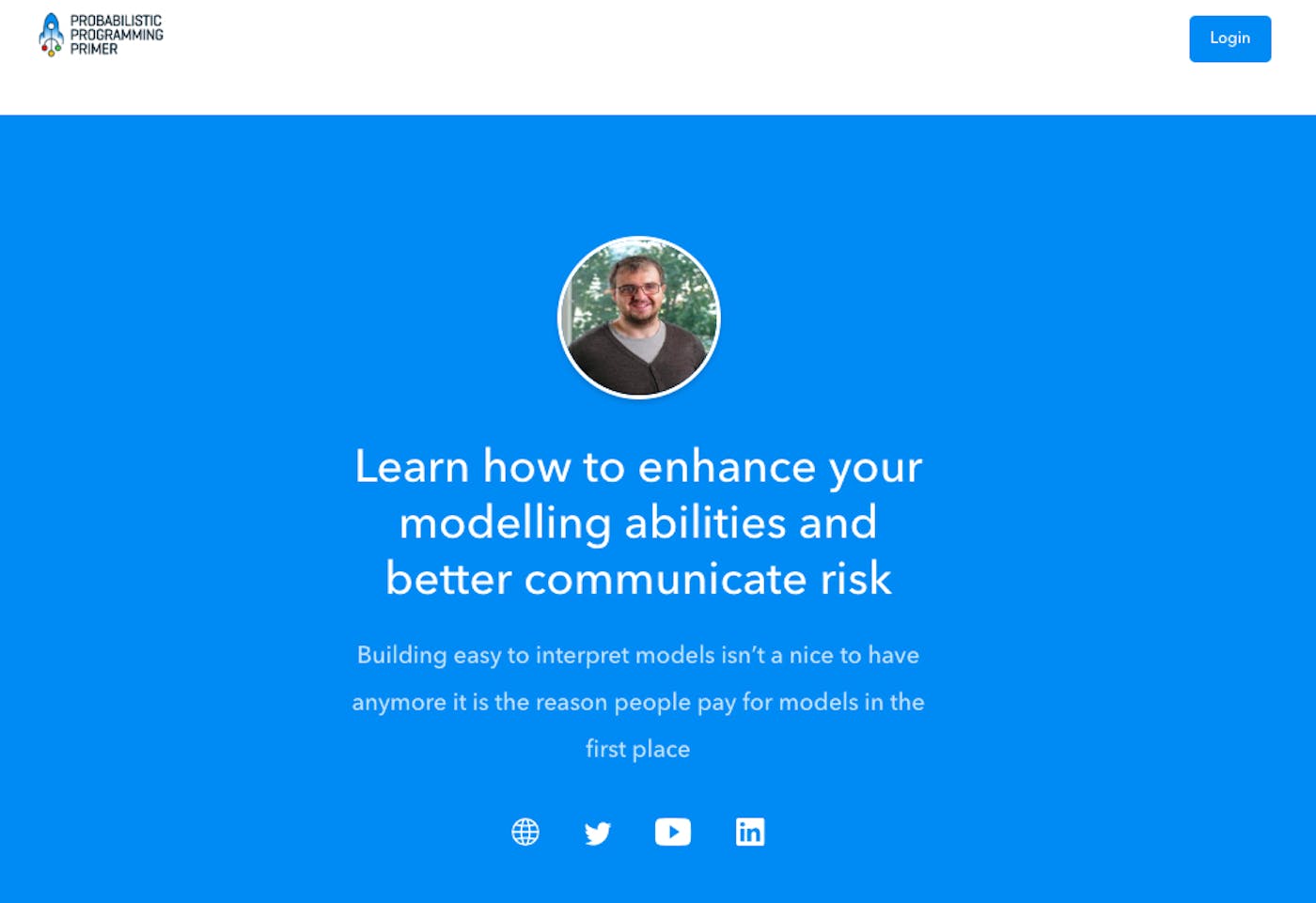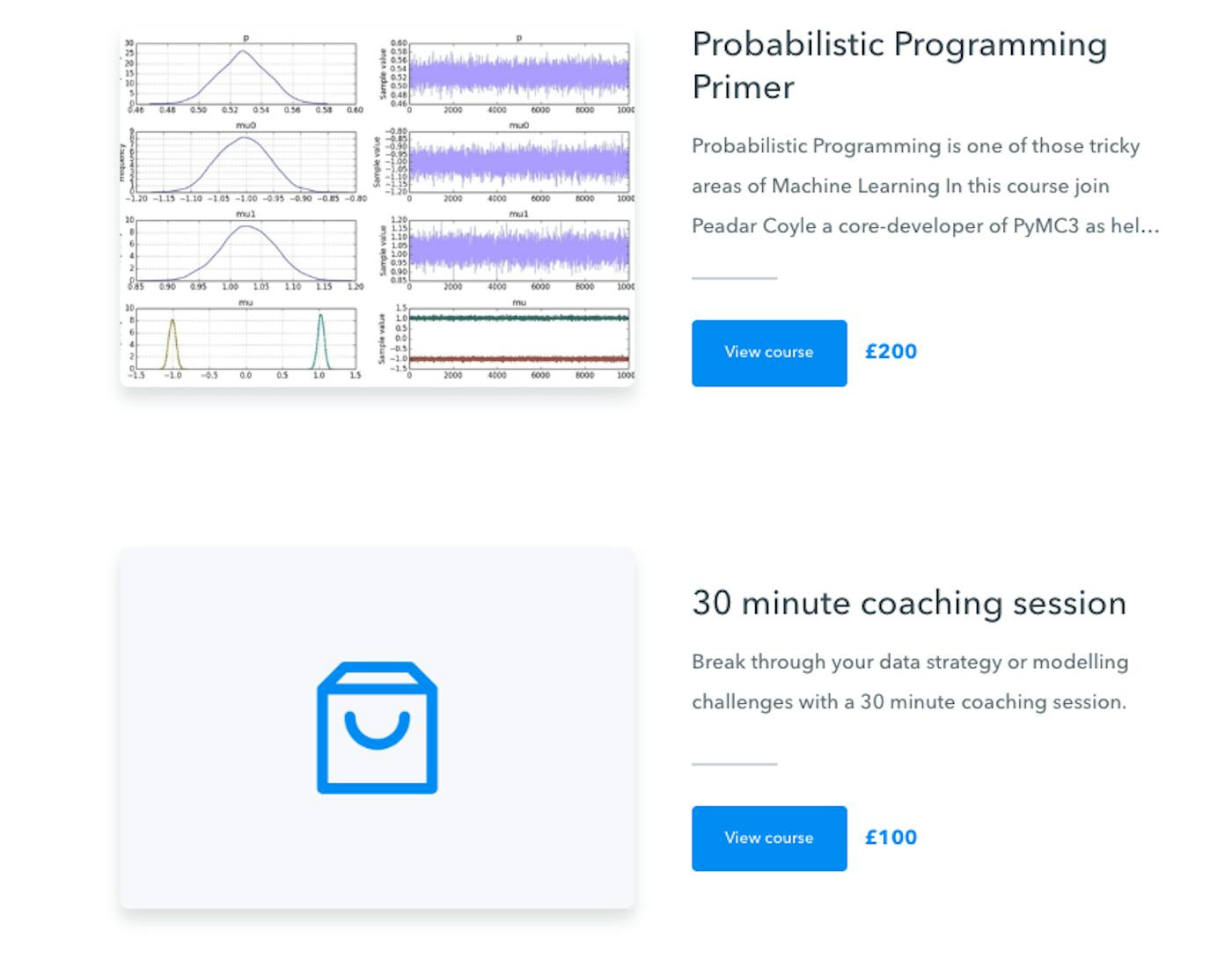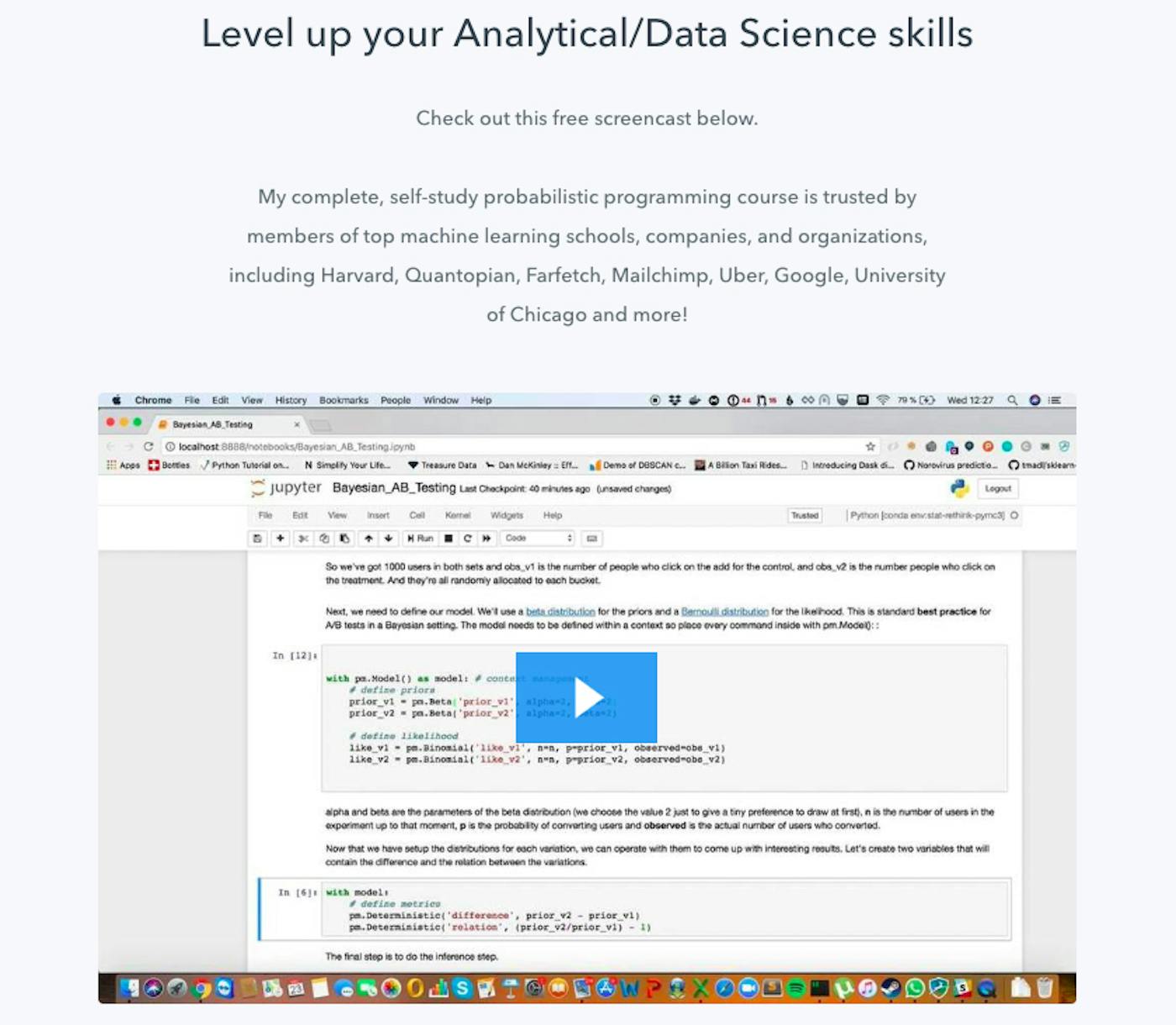How I Turned Knowledge (and Joblessness) Into a Profitable
Product
Hello! What's your background, and what are you working on?
I'm Peadar Coyle and I'm a machine learning engineer based in London. I'm known for some of my OSS work, particularly PyMC3. I set up Probabilistic Programming Primer after repeatedly being asked at conferences if I would consider doing a course, and I chose online content specifically to account for scalability.
It’s been going well so far—I've made about 7k GBP since August, so I've more than broken even.

What motivated you to get started with Probabilistic Programming Primer?
I had just left my job when I started building out the course and was feeling unsure about whether I should go into self-employed consultancy or get another job. I had some time to think on it, so I decided to see where things led with the courses. I validated the idea by using podia to collect emails with feedback. After about a month, I’d gotten 100 emails expressing interest and I knew I had enough customer demand to move forward.
I'm a core contributor to PyMC3 and have given talks at major conferences around the world on Bayesian Statistics, so I had the credibility and the expertise. I considered doing a membership website, but I wasn't sure about how much commitment I could really give.
What went into building the initial product?
In the beginning, I focused pretty exclusively on validating my ideas and understanding product-market fit. All in all, I spent around two to three weeks working full-time on the original content, which I based on some courses I had done before. Throughout the process, I asked friends for feedback and advice and made decisions about what to include and what not to include as intentionally as possible. For example, I made a conscious choice not to dive into very advanced topics.
While I can code, I didn't want to invest a lengthy amount of time in development. I thought that validating the product and making sure the content was really on the mark was more important, and also felt that engineers tend to over-engineer when they jump into the development process too soon. I used podia, MailChimp, Zapier, and Facebook and Google Ads to promote the courses and get things off the ground. I'm happy with all of the tools I used to build the initial product.
One thing I wish I'd done earlier was to build out a mailing list, and I've hired a freelancer to help me grow that.
I've pretty much bootstrapped this from zero, without a huge amount of investment on my own part financially. I funded everything with my own savings.
How have you attracted users and grown Probabilistic Programming Primer?
I initially used a pre-launch to validate my idea, which snowballed into more users over the course of a few months. I definitely want to work on attracting more traffic to the site. I’m currently at around 800 visits per month, which is pretty disappointing. It’s definitely too low.
I currently have around 65 paying customers. I had 12 in October, which was a good month for me, and acquired 23 new customers in November. Some of that was the power of my advertising campaign, but I also got a boost from discounts I offered around Black Friday.
I used a combination of marketing and advertising techniques, including landing pages to distribute a free online course, which acted as lead generation to get email addresses. I also did some advertisements and used online forums and newsletters to promote the course. Specifically, I focused on programming and data science newsletters. So far I haven’t had any luck with LinkedIn ads or Hacker News.
Some students started promoting the course organically, which was a great validation signal, and I emailed friends and former colleagues directly to get their feedback and encourage them to promote it as well. Affiliate marketing has been a total bust, and using other people’s email lists has also proven fairly unfruitful. I’m really interested in talking about these strategies and how best to utilize them with other people, so if you have any insight to offer please reach out!
I tried to be systematic about my approach, so I wrote my goals down, set targets, and was ruthless about my budget. This helped me get to over 500 on my mailing list within a few months. Another thing I did to raise my profile and get the word out was to speak at conferences. One of the subsequent videos posted to YouTube has at least 7,000 views and helped me get email sign-ups without putting in too much effort.
I had no real experience with copywriting or email marketing before starting this venture, so I had to turn to books and other resources, including Indie Hackers, to help me learn and hone the craft. Going forward I'll be investing more time in SEO and blogging content, and I'm also very interested in doing more podcasts. The few that I've done have helped enormously.
One mistake I've made is that I've experimented with lots of levers, but not to a rigorous manner. I’m working on changing that.
What's your business model, and how have you grown your revenue?
My gross volume at the time of this interview is £7,217.02, and most of that is profit. Since it's content and podia is a fixed price, it’s high margin. My expenses are largely advertising, SaaS (MailChimp for example), and labor costs such as paying for designers or freelance admin support. My monthly costs are generally 200-400 pounds per month. I try to keep these costs low, but I invested some of my November revenue into better processes and advertising.
| Month | Revenue |
| Aug ‘18 | 783 |
| Sep ‘18 | 763 |
| Oct ‘18 | 895 |
| Nov ‘18 | 3115 |
| Dec ‘18 | 1132 |
Originally I only offered Stripe, now I offer PayPal as well. I wish I'd offered PayPal earlier, it definitely cost me sales. I make money from online coaching lessons—by video chat and from my online course. The vast majority is from a fixed price for the course.
To support my community, I run a Slack channel, and this has been gaining interest recently. I think training is something that people invest in at different times of the year, so there’s a bit of a seasonal aspect to the business. This month I expect to make 1,000-2,000 GBP. Discounts and deadlines seem to drive people to pay for the course, and pricing changes have definitely helped my revenue. I think I underpriced at the start, and I'm still experimenting with adding content.
I always intended to make this a paid-for course, so I started charging from the moment I got some engagement on my email list. My pricing structure has changed with time, and I think will keep evolving, particularly as I add more content. I also think I've improved at explaining the value proposition of the course, which was a challenge initially.

What are your goals for the future?
I'd like to drastically improve my traffic—top of the funnel is a big problem for me—and would love some assistance in doing this. I have some content in the pipeline and will be focusing on SEO and doing podcasts to drive up my numbers.
I’d eventually like to make between 20-40k in revenue from this and may create follow-up courses to help me reach that goal. I realize that my product is definitely a bit niche, so I might run into market saturation down the line.
Personally, I've been learning tons about product-market fit and how to move the various levers of a business. I want to continue to learn and grow personally, as well as grow my business.
What are the biggest challenges you've faced and obstacles you've overcome? If you had to start over, what would you do differently?
It’s been hard for me to learn to respond to the emotional aspect of volatile cashflow.
I've struggled to drive traffic to my blog and website, which has been a missed opportunity. I don't think I made any seriously bad tech decisions. I've been investing in help and support from freelancers on things I know I'm bad at, like helping me improve my email marketing. I made some mistakes early on by sending out too many emails at once, and I should have tagged my emails and segmented them earlier. I wish I'd invested more time in building out my email list early on, I got a bit blindsided by all the work that goes into a product launch.
Conversations with customers have taught me a lot, especially around the importance of articulating your value proposition. It’s something you need to get down if you want to succeed, especially in a niche market.
Have you found anything particularly helpful or advantageous?
Anything by Amy Hoy and insights from Patrick MacKenzie (@patio11) have been insightful.
Tech-wise, I think I made a good decision in using podia, their support has been amazing.
I've been good at being self-motivated, and I like to keep working. My wife is constantly amazed at my ability to work, even if bored.
I think a background in the sciences and OSS work has cultivated a lot of my ethos. I've always been interested in growth hacking and marketing, more so than most engineers. I think overall that more developers are investing in their skills, and the rise of Coursera and other platforms has helped whet the appetite for online courses. I consider this and the rise of Open Source software to be two big trends that have helped me make some money out of this.

What's your advice for indie hackers who are just starting out?
I think too often we’re scared to get started and daunted at the prospect of talking to customers. I spent several years talking to people about how they were learning modern machine learning techniques. This, coupled with working on a library, taught me a lot about what is easy and what is hard.
A big mistake I see some entrepreneurs make is in underestimating the importance of hard work and overemphasizing the importance of big ideas. You have to get out there and make it happen. That means email people, cold call, stay up late—do whatever you need to do.
Where can we go to learn more?
Feel free to ask me questions about anything I've said in this interview. I'm @springcoil on Twitter, and I run peadarcoyle.com. If you see me at a conference, come and chat with me, I love talking about tech and business. We live in truly exciting times.
